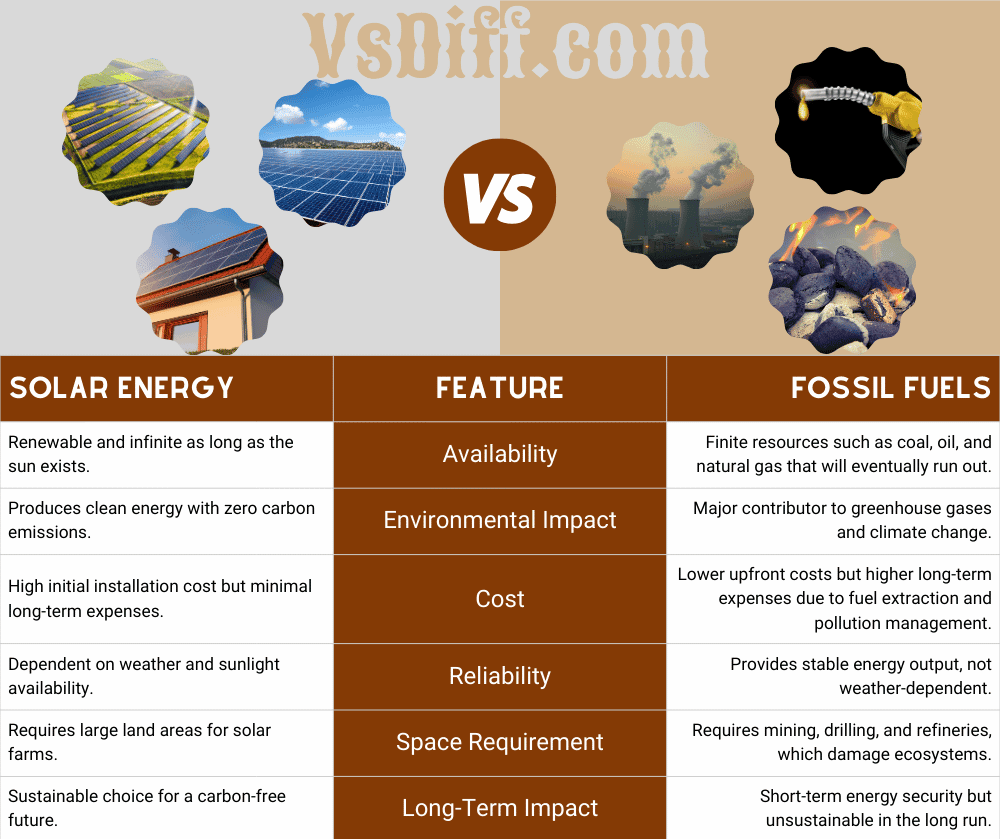Solar Energy vs. Fossil Fuels: A Detailed Comparison
When it comes to powering the modern world, two major energy sources stand out: solar energy and fossil fuels. Both play vital roles in electricity generation and daily life, but they differ in terms of sustainability, cost, and environmental impact. Let’s dive into a comprehensive comparison.
Key Differences Between Solar Energy and Fossil Fuels
| Solar Energy | Feature | Fossil Fuels |
|---|---|---|
| Renewable and infinite as long as the sun exists. | Availability | Finite resources such as coal, oil, and natural gas that will eventually run out. |
| Produces clean energy with zero carbon emissions. | Environmental Impact | Major contributor to greenhouse gases and climate change. |
| High initial installation cost but minimal long-term expenses. | Cost | Lower upfront costs but higher long-term expenses due to fuel extraction and pollution management. |
| Dependent on weather and sunlight availability. | Reliability | Provides stable energy output, not weather-dependent. |
| Requires large land areas for solar farms. | Space Requirement | Requires mining, drilling, and refineries, which damage ecosystems. |
| Sustainable choice for a carbon-free future. | Long-Term Impact | Short-term energy security but unsustainable in the long run. |
Why Solar Energy is Gaining Popularity
With falling installation costs and growing awareness of climate change, solar energy has become one of the fastest-growing energy sources worldwide. Governments and businesses are investing heavily in solar technology to reduce dependence on fossil fuels.
The Role of Fossil Fuels Today
Despite their environmental drawbacks, fossil fuels still dominate global energy consumption due to their efficiency and existing infrastructure. Transitioning to cleaner alternatives will take time, but solar energy is set to play a central role in this shift.
Video Explanation
👉 Watch the video explanation here: https://www.youtube.com/watch?v=DWiEsfZRx8g
FAQs About Solar Energy vs. Fossil Fuels
Q1: Which is cheaper, solar or fossil fuels? Fossil fuels are cheaper in the short term, but solar becomes more cost-effective in the long run due to zero fuel costs.
Q2: Can solar energy completely replace fossil fuels? Not yet, but with advancements in storage and infrastructure, solar could cover a significant share of global energy demand.
Q3: Why are fossil fuels harmful to the environment? Burning fossil fuels releases carbon dioxide, methane, and other pollutants that cause climate change and health risks.
Q4: Is solar energy truly 100% clean? While solar panels have some environmental impact during manufacturing, the energy they produce is emission-free and far cleaner than fossil fuels.
References:
